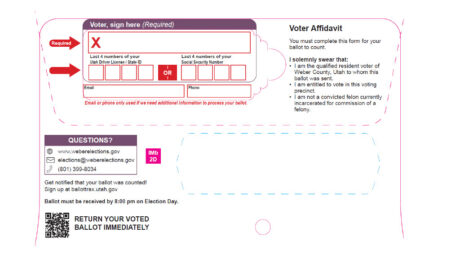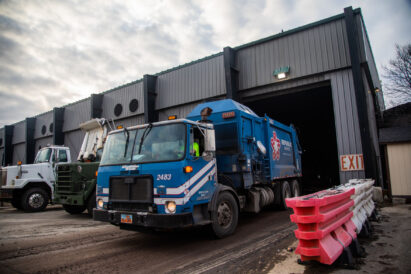As Ogden questions renewable energy measure, proponents tout initiative
OGDEN — Ogden leaders, at least publicly, may be quiet about an initiative meant to spur increased use of renewable energy in Utah locales.
They definitely have some reservations and questions they’re sorting through, particularly the impact change would have on power bills for lower-income Ogden residents. “We’re still trying to find out more definitively what it means for our residents,” said Jay Lowder, public services director for the city.
But he said they’re still investigating the possibility, outlined in a 2019 Utah legislative initiative, House Bill 411, which created the Community Renewable Energy Program. Beyond that, there’s a strong grassroots contingent in the city — worried about faltering interest from city leaders — that favors bolstering renewable power production. They keep prodding for forward movement on HB 411.
Linda Zeveloff, for one, thinks it’s too early for the city to pass judgment. She’s part of Ogden 100, the informal group that’s taken shape to champion the cause of HB 411, which has drawn interest from 20-plus communities in all across the state. “Everybody’s saying there’s too many obstacles, it’s not going to work,” Zeveloff said.
But there’s time to dig into any lingering questions, like the impact moving to renewables would have on power rates, she said. What’s more, environmental experts at Weber State University are more than willing to lend a hand. “There’s ample opportunity for them to speak to experts,” Zeveloff said.
Broadly, HB 411 provides the framework for communities across Utah to join together in seeking more renewable energy resources, theoretically using the synergies of acting collectively to make dramatic change more feasible. The aim is to move away from cabon-based energy resources, thus protecting the environment.
Justin Owen, who works with Weber State University’s Energy and Sustainability Office, said the city has taken the university up on its offer of help in parsing the pros and cons of the HB 411 program. The university has not taken an official stance on the notion, he said, though many faculty members are eager to see the city take part. “It’s still very, very early in the process,” Owen said.
That said, the clock is ticking, even if the drop-dead deadline to definitively decide whether to participate is a few months off. Locales willing to be “anchor” communities in seeking out more renewable energy resources are to step forward by July, according to Lindsay Beebe, senior campaign representative for the Sierra Club in Utah, an HB 411 proponent. Salt Lake City, Moab and Park City have signaled interest in becoming anchor communities.
Locales are to decide once and for all if they intend to take part by next January.
HB 411 creates a mechanism for Utah communities to join forces in seeking increased power generation via renewable means by Rocky Mountain Power, the power company. “It’s unique in that it serves as a model of municipal partnership with a major utility to deliver a customer choice model,” reads the website of Utah 100 Communities, the coalition of locales interested in participating in the effort.
Coming together as a large bloc of communities and asking Rocky Mountain Power to build more renewable energy production facilities theoretically makes it more economically feasible because of economies of scale. Moreover, proponents say, the process outlined in HB 411, if brought to fruition, stands to bolster renewable energy production more than possibly any other government initiative out there.
“This program is unmatched in impact anywhere in the state and it’s not like it will come around ever again,” said Beebe.
Leaders in Ogden, though, have questions that make proponents like Zeveloff worry the city will get cold feet before getting enough solid information. Notably, the city of Ogden isn’t listed among the 20-plus communities that have expressed interest in HB 411 on the Utah 100 Communities website, making some question the city’s commitment. The Ogden City Council initially voted on Dec. 3, 2019, in a 5-2 vote to pursue potential participation in the Community Renewable Energy Program.
The city seems quiet on the issue “so we don’t know what’s happening anymore,” Zeveloff said.
One of the big concerns for city officials is the potential for increased power rates by moving to renewable resources and the upshot of such change to lower-income Ogden residents.
“You can’t leave the folks that would be mostly affected, greatly affected. You just can’t leave them behind without consideration,” said Lowder, the Ogden city official. “We’re going to be cautious. We’re always cautious when it deals with something that could have great effect on our citizens.”
Zeveloff said HB 411 proponents share those concerns and she worries the city is jumping too quickly to conclusions about the impact of the measure. “We’re still trying to inform our City Council at this point to stay the course, get the information they need,” she said.
Owen, for his part, is optimistic that building renewable power-generating resources on large enough scale would temper an upward shift in rates. “The bigger the program is … the less expensive it will be,” he said.
He also notes that an opportunity like that offered by HB 411 doesn’t always come around. “This is a limited opportunity for renewable energy procurement,” he said.



